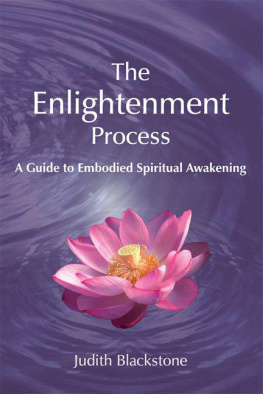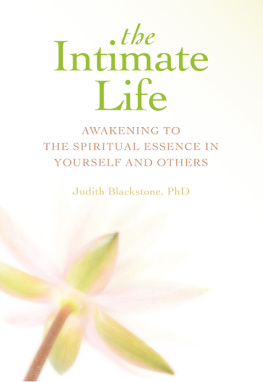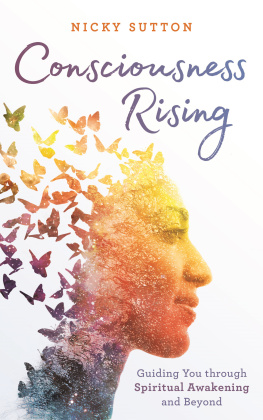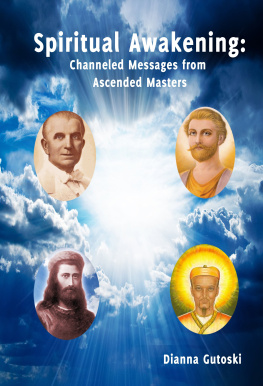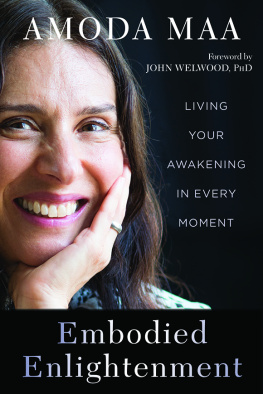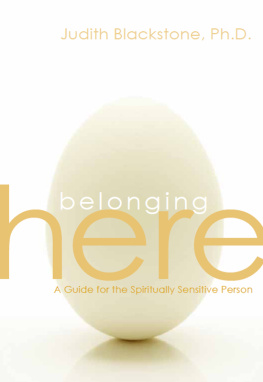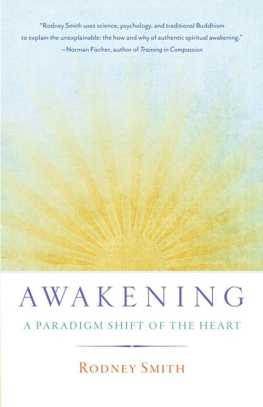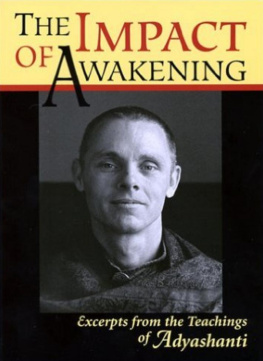Blackstone - Enlightenment Process: A Guide to Embodied Spiritual Awakening
Here you can read online Blackstone - Enlightenment Process: A Guide to Embodied Spiritual Awakening full text of the book (entire story) in english for free. Download pdf and epub, get meaning, cover and reviews about this ebook. year: 2011, publisher: Paragon House, genre: Religion. Description of the work, (preface) as well as reviews are available. Best literature library LitArk.com created for fans of good reading and offers a wide selection of genres:
Romance novel
Science fiction
Adventure
Detective
Science
History
Home and family
Prose
Art
Politics
Computer
Non-fiction
Religion
Business
Children
Humor
Choose a favorite category and find really read worthwhile books. Enjoy immersion in the world of imagination, feel the emotions of the characters or learn something new for yourself, make an fascinating discovery.
- Book:Enlightenment Process: A Guide to Embodied Spiritual Awakening
- Author:
- Publisher:Paragon House
- Genre:
- Year:2011
- Rating:5 / 5
- Favourites:Add to favourites
- Your mark:
- 100
- 1
- 2
- 3
- 4
- 5
Enlightenment Process: A Guide to Embodied Spiritual Awakening: summary, description and annotation
We offer to read an annotation, description, summary or preface (depends on what the author of the book "Enlightenment Process: A Guide to Embodied Spiritual Awakening" wrote himself). If you haven't found the necessary information about the book — write in the comments, we will try to find it.
Blackstone: author's other books
Who wrote Enlightenment Process: A Guide to Embodied Spiritual Awakening? Find out the surname, the name of the author of the book and a list of all author's works by series.
Enlightenment Process: A Guide to Embodied Spiritual Awakening — read online for free the complete book (whole text) full work
Below is the text of the book, divided by pages. System saving the place of the last page read, allows you to conveniently read the book "Enlightenment Process: A Guide to Embodied Spiritual Awakening" online for free, without having to search again every time where you left off. Put a bookmark, and you can go to the page where you finished reading at any time.
Font size:
Interval:
Bookmark:
THE
ENLIGHTENMENT
PROCESS
A Guide to
Embodied Spiritual Awakening
JUDITH BLACKSTONE

PARAGON HOUSE
St. Paul, Minnesota
Published in the United States by
Paragon House
1925 Oakcrest Avenue
St. Paul, MN 55113
Copyright 2008 Paragon House
All rights reserved.
No part of this book may be reproduced, in any form, without written permission from the publisher, unless by a reviewer who wishes to quote brief passages.
First e-book 2011
E-book ISBN: 978-1-61083-018-8
Library of Congress Cataloging-in-Publication Data
Blackstone, Judith, 1947-
The enlightenment process : a guide to embodied spiritual awakening / by
Judith Blackstone.
p. cm.
Summary: Describes the process of spiritual enlightenment using
meditational and physical exercises that can help deepen spiritual
awareness, develop the capacity to connect with others and reconnect with
the world--Provided by publisher.
Includes bibliographical references (p. ) and index.
ISBN-13: 978-1-55778-873-3 (pbk. : alk. paper)
1. Spiritual life. 2. Self-realization. 3. Spiritual exercises. I.
Title.
BL624.B524 2008
204.2--dc22
2007044137
For current information about all releases from Paragon House,
visit the web site at http://www.paragonhouse.com
ACKNOWLEDGMENTS
I offer my deepest thanks to my husband, Zoran Josipovic, and to Meg Lundstrom, for their encouragement, advice, and precious company as I wrote and rewrote this book. And to my many teachers and healers, and my students, whose courage and wisdom inspire me every day.
CONTENTS
PREFACE
Although enlightenment is no more mysterious than many other human experiences, such as our ability to love or to create, it is more rare. It only occurs as we reach a particular degree of sensitivity or openness to life. Most books about spirituality focus on more common spiritual experiences, such as the ability to feel compassion for other people, or to be attentive to the present moment. Yet I have found that many people are capable, with some practice, of the experience described here. This is the realization, or unveiling, of a subtle dimension of consciousness pervading our own being and everything around us as a unified whole. It is the experience of the luminous transparency of ourselves and our environment, and the fullness and vividness of being that occurs with it.
The revisions in this book (first published in 1997) reflect my endeavor to more clearly describe enlightenment and its relationship to psychological healing and embodiment, and to address questions that readers of the first edition have posed to me. My most difficult decision in presenting this new edition was whether or not to change the title. I chose to keep the title after a long debate with myself about the merits of the word enlightenment. Although this word is generally associated, in the Asian spiritual texts, with the type of experience I am describing, it has many other popular uses. And for many people, it signifies an extremely advanced, virtually inaccessible state of spiritual attainment. However, I also thought that it was important to preserve some of the mystical quality that this word implies. One of the changes that has occurred since I first wrote this book is that Asian spiritual ideas and practices have become more widely accepted in the West, entering both our mainstream popular culture and our scientific and philosophical communities. This means that descriptions of spiritual experiences are regarded as somewhat more valid than in the past. But there may also be a drawback to this growing popularity. That is, we may, as a society, reduce the Asian knowledge of our spiritual potential to something more palatable to Western taste, something that does not present too much of a challenge to contemporary Western beliefs. I chose to keep the word enlightenment in the title and in the following text in order to express that this experience, although accessible to anyone interested in it, leads beyond what we can grasp with our intellect or our technology.
Contrary to the basic tenets of contemporary Western philosophy, the experience of our fundamental, unified dimension of consciousness is uncreated; it arises spontaneously as we relinquish our constraints on ourselves. Enlightenment is the laying bare of our own human nature, and yet it is extraordinary. It means to experience oneself and the world as made of the light of consciousness. I hope to convey, in the following pages, both the accessibility and the preciousness of this experience.
INTRODUCTION
Enlightenment is often spoken of as awakening. But what do we awaken to? How does enlightenment transform our experience of our environment, other people, the cosmos, and our own self? This book is about the relationship between the individual self and the unity of self and other experienced in spiritual awakening.
Most psychologists claim that a healthy self is the goal of human maturity. Yet many of the Asian spiritual teachings say that there is no self. They teach that the sense of self is delusory and that belief in the self is the greatest obstacle to spiritual progress. For contemporary seekers, who for the most part are pragmatic and just want to get on with it, this conflict of ideas is often a source of doubt and confusion. They ask: If I am to be more aware of my feelings and needs, as Western psychology advises, if I am to think for myself and maintain my boundaries, how am I to achieve the cosmic unity and unconditional love promised in spiritual teachings? And if I am not truly a separate self, how should I reconcile myself to living in this separate shape? If the experience of my body is also delusory, what can I do about the sensations and hungers that I feel in my body?
As you will see, because of my own particular path to enlightenment, this book presents a somewhat different view than many other books on this subject. It does not emphasize changing ones beliefs or behavior, although that is certainly part of the enlightenment process. Instead, it describes how enlightenmentthe experience of ones own nature as subtle, unified consciousnessis revealed through deeply inhabiting ones body. Through this internal contact with our body, we come alive within our own skin, at the same time that we experience ourselves as open and unified with everything around us. This means that our tangible sense of existing in our distinct form develops as we transcend our distinct form. Although it seems paradoxical, we become more present and authentic at the same time as we become more permeable and transparent.
I will begin by telling you briefly how I came to the understanding presented here. Like many stories of awakening, mine begins with a crisis, an injury that shattered the identity that I had created for myself. When I was ten, I became a dancer, performing with a dance company in New York City. I grew up in a strictly atheistic background, and dance was my spiritual nourishment. The discipline of a dancers life has much in common with monastic life. The rigor and focus of the daily classes, of physical exercises done repetitively in unison with other dancers, can quiet the restless mind, and dedicate the heart to a single purpose. During performances, communion with the dark, responsive expanse of the audience can instill the awe of connecting with something greater than oneself. I had also felt, since early childhood, a numinous presence in nature and in the sky. Before performances I would pray to this presence. I felt that I could draw it inside my body, and that it would displace my fears or self-consciousness until there was nothing left but the dance itself.
Next pageFont size:
Interval:
Bookmark:
Similar books «Enlightenment Process: A Guide to Embodied Spiritual Awakening»
Look at similar books to Enlightenment Process: A Guide to Embodied Spiritual Awakening. We have selected literature similar in name and meaning in the hope of providing readers with more options to find new, interesting, not yet read works.
Discussion, reviews of the book Enlightenment Process: A Guide to Embodied Spiritual Awakening and just readers' own opinions. Leave your comments, write what you think about the work, its meaning or the main characters. Specify what exactly you liked and what you didn't like, and why you think so.

